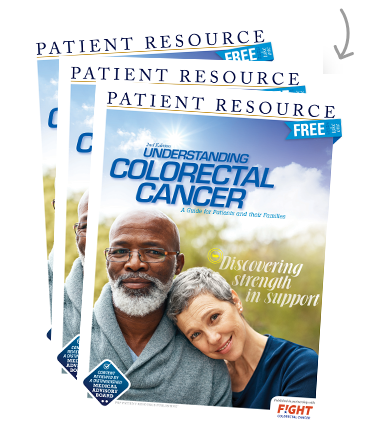Colorectal Cancer
Caring For An Ostomy
An ostomy is a surgical procedure to create an opening (a stoma) from an area inside the body to the outside. Some people with colorectal cancer may have a colostomy or ileostomy as a way to eliminate waste depending on the part of the intestine that is involved.
A stoma may be temporary or permanent. It will need to be cared for to prevent infection, and you will need to learn how to change the pouch.
Cleaning
To clean the skin around your stoma, water is recommended. Soap will not hurt the stoma, but you must rinse the area around it well. Before putting on the skin barrier or pouch, dry your skin completely. Cleaning around the stoma may cause some bleeding but it should stop quickly. If it doesn’t, call your ostomy nurse or doctor.
Allergies and Sensitivities
It is possible to become allergic or sensitive to the adhesive, skin barrier, tape or pouch material right away or even weeks, months or years after using it. Consult with an ostomy nurse if you have allergic symptoms.
Colostomy Irrigation
This is only used for descending and sigmoid colostomies to help move stool through the colon. It is not used as often now that pouch systems have improved. Ask your doctor or ostomy nurse if irrigation is right for you.
Emptying and Changing the Pouch
Before you leave the hospital, you will be shown how to empty and change the pouch. It is recommended to empty the pouch when it reaches a third to half full to prevent leaking. Having a regular changing schedule may be helpful. The pouch will need to stick to your skin, and the length of time it stays may depend on the weather, skin condition, weight changes, activity and the type of waste. Because the pouch needs to seal to the skin, you may need to shave the area around the stoma. Rinse well, and let the skin dry before applying the pouch.
Common Challenges
- Gas can be a problem right after surgery or because of certain foods. Eat regular, smaller meals, and don’t skip meals. Odor-resistant pouches are available. Medicines may also help, so ask your doctor or ostomy nurse.
- Some medicine capsules may come out into the pouch. This may indicate you didn’t receive an adequate dose of the medicine. Call your doctor or pharmacist to see if a liquid medication that is easier to digest may be available.
- If large areas of skin become red and sore, you will not have a good seal around the stoma. If the irritation gets worse, call your doctor.
- There may be times when there is little to no output. If you develop cramps, pain and/or nausea and your stoma has not been active for four to six hours, contact your doctor right away.
- Diarrhea is an indication that something isn’t right. It occurs when food moves too quickly through the small intestine for fluids to be absorbed. As a result, fluid and electrolytes may need to be replaced to avoid other problems. It may also be caused by eating certain foods, emotional stress, an intestinal infection or food poisoning, antibiotics or a partial blockage.
- Dehydration could be a serious problem. It can cause an electrolyte imbalance. Make sure you are drinking enough fluids.
- Phantom rectum can occur after rectal surgery. Your brain may treat your surgical site as if the rectum were still present. This is similar to the feeling of having a limb after the limb is removed. This can be temporary or can linger for a long time. Some people who have experienced it say sitting on the toilet helps.
- Short bowel syndrome may occur when a large portion of the small intestine is removed. There may not be enough intestine to absorb nutrients and you will need to be under medical supervision.



